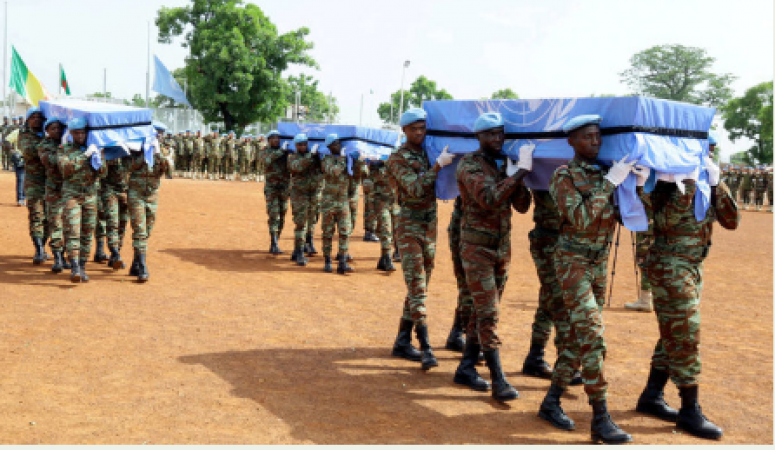
New York: The military junta in Mali, which has hired mercenaries from Russia's Wagner Group to assist in fighting insurgency, has demanded that the UN Security Council end its peacekeeping mission there immediately.
The insurgency has been a problem for Mali, a landlocked nation in West Africa, for more than ten years. Its relationships with the international community have deteriorated in part as a result of the Wagner mercenaries being hired by the junta in power.
The mercenaries have also been fighting alongside Moscow in the conflict in Ukraine, and last week, they took part in a brief uprising against the Russian military under the leadership of Yevgeny Prigozhin, the founder of the Wagner group.
Also Read: US Eases Sanctions on Ethiopia Amid Human Rights Progress
The French-drafted resolution, which was approved 15-0, ends the MINUSMA peacekeeping mission's mandate as of this Friday. It directs the mission to begin withdrawing more than 15,000 personnel on Saturday and finish by the end of the year.
Jeffrey DeLaurentis, the deputy ambassador for the US, expressed regret over the military government's decision to stop supporting the UN mission.
He also warned the mission that "some domestic actors" in Mali are advocating for the harassment of peacekeepers and urged them to make sure that UN buildings and equipment are moved to places that have been designated by the UN in a secure and orderly manner.
"The UN has a responsibility to minimise the risk that its assets fall into the hands of those looking to destabilise Mali, or bring harm to its people, including violent extremist organisations and the Wagner Group," he stated.
Mali's desire for the peacekeepers to depart at a time when the region is "facing increasing instability and humanitarian needs," expressed regret by British Ambassador Barbara Woodward.
"And we do not believe the partnership with the Wagner Group will deliver long-term stability or security for the Malian people," she added.
Meanwhile, John Kirby, a spokesman for the US National Security Council, expressed extreme concern over Wagner's destabilising activities in Africa, particularly in Mali and the Central African Republic.
Also Read: Sunak's Game-Changing Plan: UK and Italy Forge Deal on Mediterranean Migrants
According to US information, he told reporters in Washington, "the Malian transition government has paid over $200 million to Wagner since late 2021." He claimed that in spite of the payments, central Mali has seen an increase in violent crime and terror attacks.
Furthermore, according to Kirby, "Prighozin helped engineer" the swift departure of U.N. peacekeepers "to advance Wagner's interests."
He added, "We know that senior Malian officials directly coordinated with Prighozin staff to inform the U.N. secretary-general that Mali had revoked consent for the MINUSMA mission.
Since 2012, Mali has struggled to contain an uprising of Islamic extremists. The following year, a military operation led by France helped remove extremist rebels from power in the country's northern cities.
However, they came together again in the desert and started launching assaults against the Malian army and its allies.
A few months later, in one of the most dangerous UN missions in history, the peacekeepers arrived.
The 309 MINUSMA personnel who died "in the service of peace during 10 years the mission was deployed in Mali," according to his spokesman, were honoured by UN Secretary-General Antonio Guterres.
Following two coups, starting in 2020, Mali has been governed by a military junta headed by Col. Assimi Goita.
In accordance with DeLaurentis and other council members, the resolution applauds Goita's commitment to holding free and fair presidential elections in February 2024 and ensuring the restoration of constitutional order in the months that follow.
Following Mali's foreign minister Abdoulaye Diop's request to the Security Council on June 16 that the peacekeepers leave the country because they had failed to restore security, the council decided to end the UN mission. "A crisis of confidence between Malian authorities and MINUSMA," he claimed.
After the vote on Friday, Diop spoke with national broadcaster ORTM and claimed that "many Malians" had called for the withdrawal and referred to the peacekeeping mission as "a threat to our country."
According to him, the government's desire to manage its own affairs and the bolstering of its military and security forces led to the decision, which was not made hastily.
Government support is necessary for the United Nations to carry out its peacekeeping missions.
Anna Evstigneeva, the deputy UN ambassador for Russia, told the council that her country supports the transitional government's "aspiration to take full responsibility and play the leading role in stabilising the Malian state."
She declared that Russia would continue to offer comprehensive bilateral assistance to Mali in an effort to normalise the country's situation.
Issa Konfourou, Mali's UN ambassador, told the council after the vote that although MINUSMA's primary objective of assisting the government in securing the nation was not accomplished, the country's citizens and government "would like to applaud its contribution in other areas," particularly humanitarian and social assistance.
While MINUSMA was not authorised to engage in combat with militants, Rida Lyammouri, senior fellow at the Policy Centre for the New South in Morocco, claimed that it did offer protection to civilians from the violent extremists.
Since the Malian army is still ill-equipped to provide adequate defence, attacks are most likely to increase now in the areas where UN peacekeepers conducted routine patrols, according to Lyammouri.
Also Read: Hong Kong Leader Issues Warning on Anniversary of Handover
In order to mediate between the Malian government and separatist Tuareg rebels, the UN mission was crucial. The resumption of hostilities between the government and the Tuareg rebels could be one of the effects of the vacuum the peacekeepers will leave, according to Ely Dicko, a sociologist at the University of Bamako.
The withdrawal "is going to be a massive undertaking for the entire UN and for Mali," according to Daniel Forti, senior analyst with the International Crisis Group. Both parties stand to lose a lot if it isn't carried out "in a consensual and united way."